|
.hack One of the oddest conventions to come out of video game fiction is the idea of a game within a game, the most notable example of which is the fantastic multi-media franchise .hack. Spanning multiple video games, anime series, manga, novels, and films, .hack's stories all take place within the fictional MMORPG "The World," along with the real-world consequences the game produces.
Common among each entry in the .hack universe is a shared question: What if actions in a video game affected the real world? To answer that question, the creators developed a complex mythos and backstory behind The World that goes into its programmers personal lives and problems, radical artificial intelligence experiments, and an impressively realistic look at what the future of gaming might hold (the series effectively predicted the arrival of the Oculus Rift, for example.)

One of the things the series does particularly effectively is to create a distinct barrier between the real world and the game world. Depending on the entry, the series takes great pains to only show one or the other at a time. For example, in .hack//SIGN, .hack//Quadrilogy, .hack//G.U., and .hack//Roots, the player/viewer is only ever able to see The World; the real world is obscured behind technology. In .hack//G.U., Haseo can get a glimpse of the real world via internet videos and email, but we never actually see what he really looks like. In .hack//SIGN, the real world is obscured so thoroughly that the main character's real gender isn't even known until the end of the series. On the other hand, in .hack//Liminality, the entire series is seen from the perspective of the real world; we never see The World itself, only images of the characters playing it. This stark divide creates a surprising sense of immersion, even in noninteractive media.
The series also uses multiple forms of media to tell a single, ongoing story. This began with the original four .hack games and .hack//SIGN, which were loosely tied together, but was done to much greater effect with .hack//G.U. and it's prequel anime .hack//Roots. In the latter case, .hack//Roots fully fleshes out the relationships between Shino, Haseo, and Ovan, which serves as the catalyst for the events of .hack//G.U. Only after experiencing both can the full story truly be appreciated.
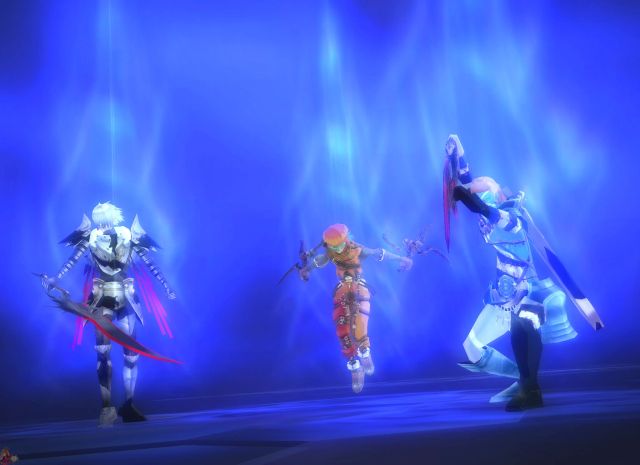
But more than anything, .hack explores the trappings of MMOs in a way that fiction rarely does. Throughout the franchise, the characters encounter griefers, hackers, GMs, glitches, exploits, kids pretending to be adults, adults pretending to be kids, players using characters of the opposite gender, message boards, friends lists, guilds, dungeons, raids, roleplayers, and even fan art. Most importantly, it explores the incredibly real relationships that can form between people connected across cities, countries, and even oceans by something as simple as a computer game.

Sadly, the .hack franchise has fallen to the wayside over the past few years. Bandai hasn't produced a major .hack project since the .hack//G.U. trilogy, and the west hasn't seen a .hack game come its way in all that time either. There was the excellent .hack//Quantum OVA series that was released by Funimation a few years ago, but that was the last time we heard from .hack in the English speaking world.
Of course, there's always Sword Art Online, if you don't mind a poorly written .hack knock-off that falls apart after ten episodes, rapidly devolving into a creepy rape fantasy. — Adriaan den Ouden
Sellswords 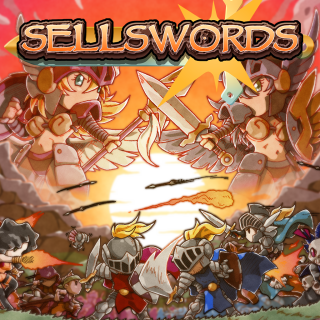
Level 99 Games' Sellswords is a tabletop card game that will feel familiar to fans of Final Fantasy VIII's Triple Triad. Unlike Zell and Squall's favorite card game, Sellswords benefits from an expanded 5x5 grid and several tactical upgrades. For example, each of the fifty cards has a special ability that influences its placement or effect on nearby cards: the archer targets distant cards, while the offensive-minded Viking is more powerful when first played. Better yet, the game isn't hamstrung with FFVIII's mandatory, computer-enforced rules like random play. Four different terrain tiles provide a similar way to modify the major rules of the game, but their use is entirely optional.
Sellswords is simple to learn, but difficult to master. Each two-player game starts with players drafting a team of six mercenary cards from a spread of twelve. Next, players take turns placing their mercenaries on the grid. When a mercenary is placed next to an opponent, the two cards compare numbers. If the active player's number is higher, the opponent's card flips. Scoring is based on the number of allied mercenaries a player has in each row and column.
Triple Triad's mechanics work best as a mini-game, where acquiring useful cards is the sidetrack to a greater quest; Sellswords, unhindered by this feature, is able to capitalize on every card being useful in different situations. Drafting a team that's able to react to the other player's mercenaries is a major strategic consideration. Once play begins, the expanded grid size and variety of character abilities offer plenty of crunchy options. Quistis may disagree, but believers in the Heart of the Cards are advised to check out Sellswords the next time a Triple Triad craving strikes. — Zach Welhouse
Chobits Chobits is another anime series from the early 2000s that, while once quite popular, has fallen into obscurity (although the occasional Chi/Freya cosplayer still pops up at conventions). Based on the manga by Clamp, Chobits is set in an alternate present day, where androids take the place of more conventional computers. As the main character Hideki is largely computer illiterate, an episode that focused on an online RPG is appropriate. In episode 12 of Chobits, "Chi Plays," Hideki gets a copy of a game called "Brave Quest Online" and is excited to try it upon learning that he could play it with Chi. Due to the fairly limited scope of this single episode, it's hard to say if "Brave Quest Online" is an MMO proper or an online action RPG like Phantasy Star Online or Diablo. Even so, a number of RPG conventions, both online and offline are apparent in this episode.
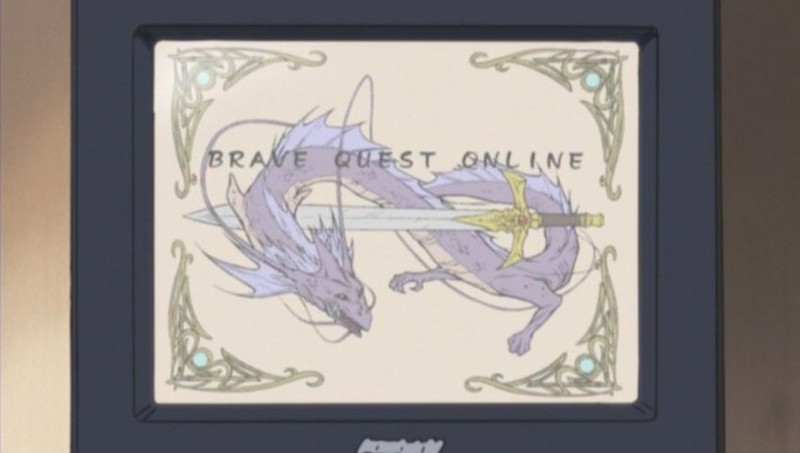
As Hideki and other characters play the game, most of them look exactly as they do in reality. However, this may be for the benefit of the viewers, as some random players can be seen dressed up in armor and mage robes. Two characters, though, Shinbo and a seemingly random individual, have females as avatars. People playing as avatars of the opposite gender is all over the place in the real world, but it seems that voice chat is always enabled in this game. The male voices coming out of their avatars is a dead giveaway. Most of the game sequences look barely discernible from regular scenes of the anime, except for the medieval fantasy backdrop. The episode does have some depleting Hit Points bars as Hideki, Shinbo, and Tsumomo fight a difficult boss, at the very least.
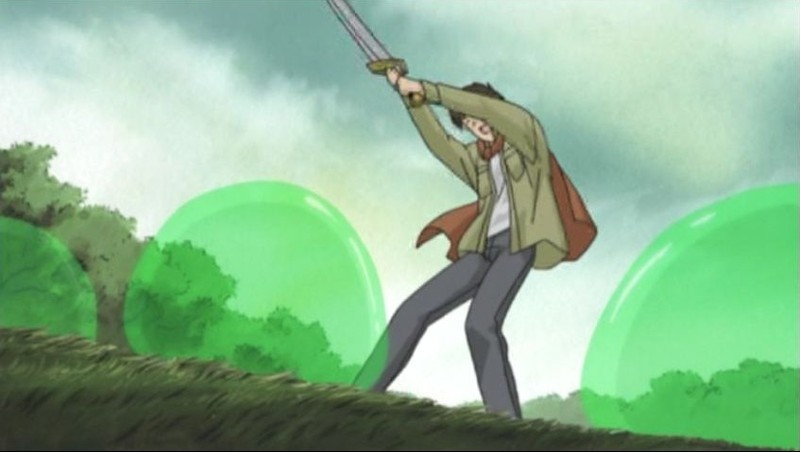
Other than HP, there is a brief allusion to some form of magic point system. Hideki is chastised by Shinbo for using too much magic, leaving him vulnerable for when he needs spells the most. Early on, Hideki is attacked by a horde of slime-like enemies, which happen to be resistant to the sword he has equipped. There is even an instance of a rude player. The random player using a female avatar mentioned earlier grumbles about having to play "Brave Quest Online" with so many neophytes. Minoru calmly points out that the game is for everyone. The person scoffs at Minoru's idealism, and then leaves him to "get better acquainted with the newbies." Minoru says that there are "manner-less people like that all over the net," but considering how such exchanges tends to go in real life online games and communities, he is downright gentlemanly.
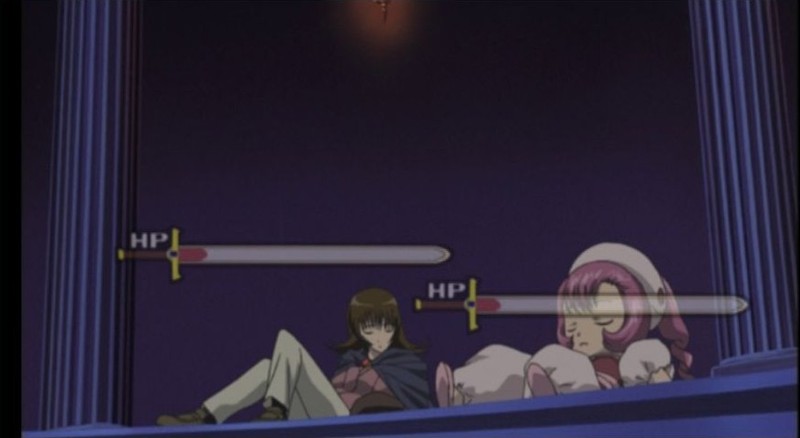
Throughout episode 12, Chi doesn't appear with the other characters in the game, leading Hideki to believe she's in some other city on the server. She eventually appears near the end of the episode to single-handedly defeat an impossible boss, winning the game for Hideki and the others. Perhaps whatever in-anime company published the game is working on an expansion, as it is short enough to beat in two nights. Or maybe the publisher is baffled by what could only be seen as a serious hacking incident. — Cassandra Ramos
« Page 2 | Page 4 »
|









